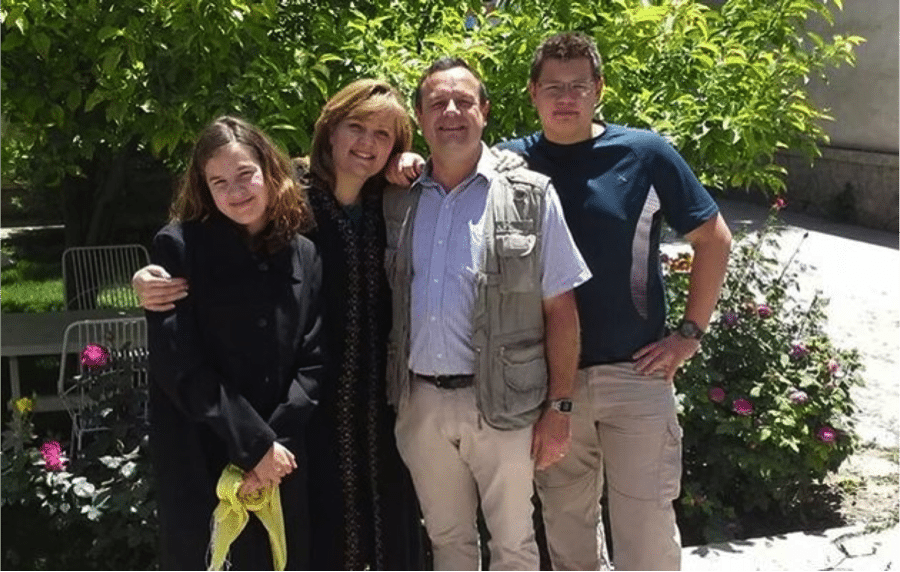filter posts:
Date
Faith is obeying God in spite of consequence
 Someone has said that faith is not “believing in spite of evidence but obeying in spite of consequence.” Abraham did that. He left his home at God’s command, and went to a place he knew nothing about. He obeyed God when he was told to take Isaac as a boy and sacrifice him on an altar. If you don’t know the story, read it in Genesis 22, and see how God stopped Abraham from carrying out the deed, but saw in his heart that Abraham loved God and believed that even if Isaac were slain, God would resurrect him to be the son of promise. Abraham obeyed in spite of consequence.
Someone has said that faith is not “believing in spite of evidence but obeying in spite of consequence.” Abraham did that. He left his home at God’s command, and went to a place he knew nothing about. He obeyed God when he was told to take Isaac as a boy and sacrifice him on an altar. If you don’t know the story, read it in Genesis 22, and see how God stopped Abraham from carrying out the deed, but saw in his heart that Abraham loved God and believed that even if Isaac were slain, God would resurrect him to be the son of promise. Abraham obeyed in spite of consequence.
That’s the story of the Groenewald family. Werner Groenewald was a South African pastor, married to Hannelie, a trauma doctor. Inspired by the terrorist attacks on the United States in 2001, Werner and Hannelie began to seek the Lord about how and where they should live. When they visited Pakistan and Afghanistan with a medical team in 2002, the direction of their lives was forever changed. Hannelie said, “We felt the touch of the Holy Spirit. I just started crying and knew that Afghanistan or Pakistan, wherever the Lord calls you, can be your home.”
In August of 2003, the Groenewald family moved to Afghanistan with their son Jean-Pierre, 5, and their daughter Rode, 3. Their families thought they were crazy to leave South Africa and move to this war-torn country where they knew they could be killed. But the certainty of their call and the support of their church gave them courage.
They served in Afghanistan for 11 years, she as a doctor and he as a teacher. On Nov. 29, 2014, Hannelie was working at the clinic, and Werner was teaching leadership to Afghan students in his home. Jean-Pierre, 17, had been playing guitar in his room and chatting with friends on social media. Rode, 15, had spent the day crocheting, and working on her computer. Late that afternoon, Afghan rebels broke into the compound where the Groenewalds lived. Confronted by the guard, the rebels shot and killed him. When Werner heard the shot he sent his students to another room to take shelter, and began to climb the stairs to protect his children. As Werner ascended the rebels burst in and shot him three times, killing him. The rebels then killed Jean-Pierre, Rode, and most of the Afghan students who were hiding throughout the house.
Hannelie says nearly two years later, “It is well with my soul.” Though finding this peace was not easy, she knows God was always there for her family. She remembers Werner’s words just a month before the attack: “We die only once. It might as well be for Christ.” Hannelie said that her only regret was that she wasn’t there with her family when they died. “I wanted to be there, especially with the children, to just embrace them and hold them and face the bullets.”
Hannelie continues to share her testimony with anyone who will listen; and looking back on her family’s journey, she says she wouldn’t change a thing. “We had a clear calling. We had a mandate with this; we counted the cost. We knew that something like this could happen. God allowed that for a reason.” Then she said, about her family members who had been killed, “I know they are actually chasing me on to finish the race as well. I believe one day Jean-Pierre will say, ‘Mom, what took you so long to get here?’ I believe they are where they are supposed to be, on Jesus’ lap, and I cannot wait to get there as well. But I have to finish this race for the Lord.”
October 31, 2016
Motivation for the times we face today
 As we slog through a very painful election cycle, I am reminded of a book I read several years ago. John Piper’s book, “Don’t Waste Your Life,” reminds us of what is significant when we can easily feel bludgeoned or discouraged by what we see happening in our nation and in the world around us. The book is an easy read, less than 200 pages, and the title is appropriate. Piper hammers the point through 10 chapters that we have been created by God for a purpose, and that all of creation is searching for a “single passion to live by.”
As we slog through a very painful election cycle, I am reminded of a book I read several years ago. John Piper’s book, “Don’t Waste Your Life,” reminds us of what is significant when we can easily feel bludgeoned or discouraged by what we see happening in our nation and in the world around us. The book is an easy read, less than 200 pages, and the title is appropriate. Piper hammers the point through 10 chapters that we have been created by God for a purpose, and that all of creation is searching for a “single passion to live by.”
He recalls the memory from his childhood of his evangelist father leading an elderly man to Christ. The church had prayed for this man for years but he had resisted. But not on this day.
God opened his heart to the Gospel of Christ, and he was saved from his sins and given eternal life. But that did not stop him from sobbing and saying, as the tears ran down his wrinkled face…“I’ve wasted it! I’ve wasted it!”
Piper said that this story gripped his heart as a child more than the stories he had heard of teens killed in car wrecks before they were converted — this story of “an old man weeping that he had wasted his life.”
One chapter in the book is titled, “Risk is Right — Better to Lose Your Life than to Waste It.” Paul wrote, “If God is for us, who can be against us?” If this verse is true and applies to you and me who know Christ, then what are we waiting for? As Woodrow Wilson said, “I would rather fail in a cause that will ultimately triumph than triumph in a cause that will ultimately fail.” And the cause of Christ will triumph!
One of the most challenging stories in Piper’s book was taken from “Flags of Our Fathers,” by James Bradley. This book details the battle for Iwo Jima in World War II and the lives of the six flag-raisers at battle’s end. Here is an excerpt:
Often it was the corpsmen [medics] themselves who died as they tried to preserve life. William Hoopes of Chattanooga was crouching beside a medic named Kelly, who put his head above a protective ridge and placed binoculars to his eyes — just for an instant — to spot a sniper who was peppering his area. In that instant the sniper shot him through the Adam’s apple. Hoopes, a pharmacist’s mate himself, struggled frantically to save his friend. “I took my forceps and reached into his neck to grasp the artery and pinch it off,” Hoopes recalled. “His blood was spurting. He had no speech but his eyes were on me. He knew I was trying to save his life. I tried everything in the world. I couldn’t do it. I tried….And all the while he just looked at me….The last thing he did as the blood spurts became less and less was to pat me on the arm as if to say, ‘That’s all right.’ Then he died.”
John Piper’s plea is that he will be able to come to the end of his life and say to the generation he served and lived in, “For your tomorrow, I gave my today. Not just for your tomorrow on earth, but for the countless tomorrows of your ever-increasing gladness in God.”
Need encouragement in these discouraging times we live in? “Don’t Waste Your Life” will challenge, convict and motivate you. It may even change your life.
October 24, 2016
Restored friendship sweeter than revenge
 The story goes that a Korean houseboy was hired by a group of American soldiers during the war to take care of their needs. The soldiers liked this young man, but they tormented him mercilessly. They nailed his shoes to the floor while he slept. They put grease on the stove handles, and mounted a bucket of water over the door so that he got drenched when he walked in. Through it all, however, he never complained. He just went about his work, and smiled, and seemed to take it all in stride. One day the soldiers began to feel guilty, so they called him in to apologize. “We want to stop all our pranks, and tell you we are sorry,” they said. “We won’t do it again.”
The story goes that a Korean houseboy was hired by a group of American soldiers during the war to take care of their needs. The soldiers liked this young man, but they tormented him mercilessly. They nailed his shoes to the floor while he slept. They put grease on the stove handles, and mounted a bucket of water over the door so that he got drenched when he walked in. Through it all, however, he never complained. He just went about his work, and smiled, and seemed to take it all in stride. One day the soldiers began to feel guilty, so they called him in to apologize. “We want to stop all our pranks, and tell you we are sorry,” they said. “We won’t do it again.”
“No more nails in shoes?” the houseboy asked.
“No more,” the men promised.
“No more sticky on stove?”
“No more,” they said.
“No more water on head?”
“No more,” they answered.
“OK,” said the houseboy. “No more spit in soup!”
Ahh, revenge. It comes to us quite easily doesn’t it? Francis Bacon said, “Revenge is a kind of wild justice.” Lord Byron said, “Revenge is sweet.”
The late financial counselor, Larry Burkett, used to tell the story of the man who bought a Mercedes for $50. He was looking in the L.A. Times classified section one day and saw an ad for a nearly new Mercedes for $50. Sure that it was a misprint, he called the number and the woman assured him that the car really was for sale for that price. He told her be would be right over, and set a new land speed record getting to her house. Expecting to find a problem but hoping against hope that this was not a dream, the man discovered a shiny new Mercedes, in mint condition, in the woman’s driveway. He quickly wrote her a check for $50 before she could change her mind, and when she handed him the keys, he said, “Do you mind me asking why you are selling this car for this price?” She said, “Not at all. My husband decided he didn’t want to be married to me any more, and he left me for another woman. He called two days ago and said we would divide everything up and told me to sell the Mercedes and send him half.”
Ahh, revenge. It just seems to feel right, doesn’t it? The problem is, many things that feel right are deadly wrong. Revenge may feel great going down, but you pay for it later. Getting revenge is like drinking poison and waiting for the other person to die.
Jesus made it clear how I am to respond when someone hurts me. If I have been offended, I am instructed to go to the person who sinned against me and tell him what he did. Just the two of us, face to face. Jesus said, “If he hears you, you have gained your brother.” That’s the goal, that our relationship would be restored, not that I get my pound of flesh. If he will not listen, then I get a trusted and mature friend and go back to him. Just the 3 of us, face to face. If he still will not listen, then I go before the church leadership with the problem. In every step, restoration is the destination, and forgiveness, not revenge, is the vehicle that will get you there.
A restored friendship is much sweeter than revenge could ever be. If you don’t believe it, call me when you want to sell your Mercedes.
October 10, 2016
Snobbery and faith don’t mix
 In his commentary on James, Kent Hughes tells the story of a woman who came from “the other side of the tracks,” to visit a prominent church in her city. She may have wondered why no one ever spoke to her or welcomed her, but she liked the church anyway, wanted to join, and told the pastor so. He told her to go and think about it for a week. She did and came back and told him she wanted to join, and he said, “Let’s not be hasty. Go home and read your Bible every day for an hour, and come back next week and see if you still want to join.” She did. And came the next week wanting to join. He said, “Let’s do one more thing. Go home and pray every day this week, asking the Lord if he wants you to come into this fellowship.” The pastor didn’t see her after that for six months. Then one day they met on the street, and he asked her what had happened. She said, “Oh, I did what you suggested. I prayed every day for a week, and one day while I was praying the Lord said to me, ‘Don’t worry about not getting into that church. I’ve been trying to get into it myself for the last 20 years!’”
In his commentary on James, Kent Hughes tells the story of a woman who came from “the other side of the tracks,” to visit a prominent church in her city. She may have wondered why no one ever spoke to her or welcomed her, but she liked the church anyway, wanted to join, and told the pastor so. He told her to go and think about it for a week. She did and came back and told him she wanted to join, and he said, “Let’s not be hasty. Go home and read your Bible every day for an hour, and come back next week and see if you still want to join.” She did. And came the next week wanting to join. He said, “Let’s do one more thing. Go home and pray every day this week, asking the Lord if he wants you to come into this fellowship.” The pastor didn’t see her after that for six months. Then one day they met on the street, and he asked her what had happened. She said, “Oh, I did what you suggested. I prayed every day for a week, and one day while I was praying the Lord said to me, ‘Don’t worry about not getting into that church. I’ve been trying to get into it myself for the last 20 years!’”
James questions the integrity of those in the church who would welcome the rich man to the church, offering him the best seat, fawning over him because of his wealth, and then telling the poor man dressed in shabby clothes to stand, or if he must, be seated on the floor. There’s a difference between showing honor to someone and showing partiality. We honored three sailors in our church two weeks ago, three young men who are stationed at different places and had come home to Antioch while on leave. If the governor or any civic leader were to visit the church, we would honor him or her because of the position God has given them. Peter said, “Honor everyone. Love the brotherhood. Fear God. Honor the emperor.” But here’s the thing. If the wealthiest person in town showed up in your church, you would do wrong to make a big show of his attendance, to honor him simply because of his wealth. The sad truth is that too often churches go even further, making a rich man an elder, not because he has the spiritual qualifications, but because he has a pocketful of cash.
The question James is asking us to consider is this: does our reaction change depending on who walks in the door on Sunday morning? To show partiality means literally to “receive the face,” to accept or reject a person based on outward appearance. Our tendency may be to see the clothes and the car and the house and the lifestyle, and to honor someone based on those things. We must not do that, and if we allow that thinking in the church, we are headed for trouble. You see, though the world puts premium value on wealth and status, the church must not, because God has turned that upside down in Christ. “He has brought down the mighty from their thrones and exalted those of humble estate; He has filled the hungry with good things, and the rich He has sent away empty.”
True riches are only found in Christ, and He welcomes all who come to Him by faith: rich or poor, highly educated or a high school dropout, powerful in society or just known by friends and family.
October 3, 2016
